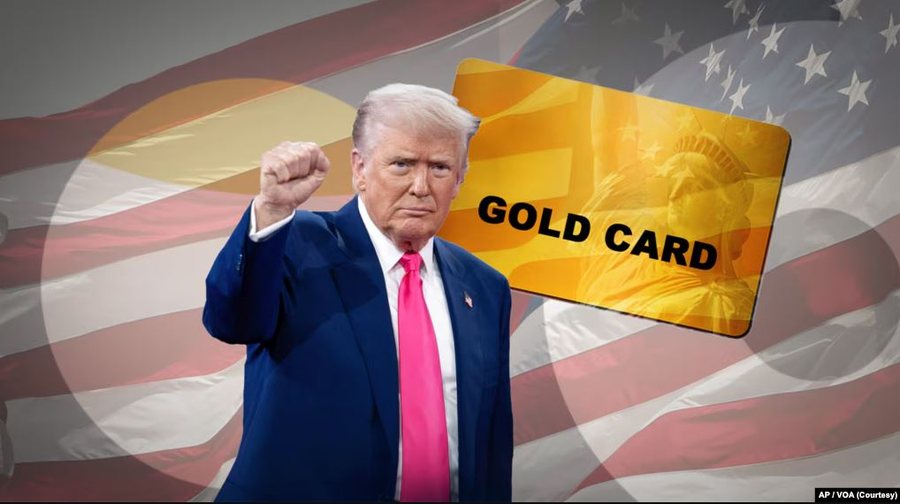
Immigration law experts say they are uncertain about President Donald Trump's announcement that the United States will begin issuing a $5 million "golden card" to wealthy foreign nationals who want to live and work in the U.S. They would also be guaranteed "a safe path to U.S. citizenship."
During their remarks Tuesday in the Oval Office, President Trump and Commerce Secretary Howard Lutnick said the program will begin in two weeks and will replace the EB-5 visa program, which allows foreign investors to live and work in the U.S. if they invest in companies that create jobs for Americans.
But the EB-5 visa program was created by a Congressional decision in 1990, and it is unclear whether President Trump has the authority to abolish it by creating a new visa program without a decision from the Capitol.
"We've prepared everything from a legal standpoint. It's perfectly legal to do," President Trump said.
Legal questions
Immigration experts don't completely agree.
"The truth is, it would take Congress to pass this," said Michael Wildes, an immigration law expert from New York.
Mr. Wildes, who has represented First Lady Melania Trump and members of her family in immigration-related matters, said that because there is little information available about the program, it is difficult to assess how much impact it is likely to have.
"He will treat people who have a lot of money better than others," Mr. Wildes told VOA. "That's consistent with his ethics."
"If the administration is proposing to redefine the terms of the EB-5 program, this is clearly illegal," Jorge Loweree, managing director of Programs and Strategy at the American Immigration Council, told VOA.
"The parameters of that program were designed by our legislative branch. The president cannot rewrite them at will," he adds.
David J. Bier, director of immigration studies at the Cato Institute, wrote on social media that "selling green cards is a good thing in theory, but Trump's specific proposal has several problems." One of them, he said, is that "President Trump cannot eliminate the EB-5 investor program that was created by Congress."
The White House did not respond to a request for comment from Voice of America.
White House Announcement
President Trump presented his plan to a group of reporters in the Oval Office on Tuesday.
"We're going to sell a golden card," President Trump said. "We're going to put a price tag on it of about $5 million, and it's going to give them the same privileges as a green card. It's going to be a path to citizenship, and wealthy people are going to come to our country after they buy this card."
President Trump said that in addition to wealthy foreigners who want to live in the United States, he believes that American corporations will be willing to buy these cards in order to hire talented people from abroad.
"Companies will pay for people to come and have long-term status in the country," he said.
There are currently several avenues available to foreigners who want to work in the U.S. The H1-B visa program allows thousands of skilled workers to come to the U.S. each year. In addition, there are several visa programs that allow executives of international companies to live and work in the U.S. if they transfer to an office or subsidiary of the company located in the U.S.
EB-5 Visa Program
Commerce Secretary Lutnick said Tuesday that the administration plans to end the existing EB-5 visa program, which he called "full of nonsense, fraud and manipulation."
The EB-5 program provides green card status to foreigners who invest $1,050,000 in companies that create at least 10 jobs. The amount can be reduced to $800,000 if the investment is made in certain infrastructure sectors or in areas of the country that the government intends to develop economically.
With his comments, Mr. Lutnick seemed to suggest that the $5 million for a 'gold card' would not be used to create new jobs, but would go directly to the federal government's coffers.
"We can use the money to reduce the deficit," he said.
High price
Shereen Chen, an immigration attorney from New Jersey, told VOA that for many wealthy foreigners hoping to come to the United States, the new rules could complicate the process.
Current rules include a “strict vetting program” to ensure that money invested under the EB-5 program was earned legally, Ms. Chen said. The process is long and difficult, and would become even more complicated, Ms. Chen said, if the amount of money being vetted were increased fivefold.
The new program would have huge implications for Chinese citizens hoping to come to the U.S. While many Chinese have used the EB-5 program, tighter monetary controls in China have made it increasingly difficult.
"Right now, it's very difficult for Chinese citizens to use the EB-5 program, even with $1,050,000, because it's very difficult for them to get money out of China," Ms. Chen said.
Common practice
The United States is not alone in implementing programs that allow wealthy foreigners to exchange their investment for the privilege of residing in a country.
Henley & Partners, a London-based consultancy that advises clients seeking residency and citizenship opportunities in other countries, is engaged in more than 100 countries around the world that offer investment programs in exchange for permanent residency.
About 30 countries offer citizenship in exchange for investment, a deal commonly known as a "golden passport."
In recent years, the European Union has pressured member states with such programs to eliminate them, due to concerns about illegal activities such as tax evasion and money laundering. /VOA (A2 Televizion)











